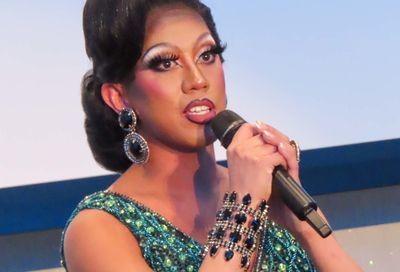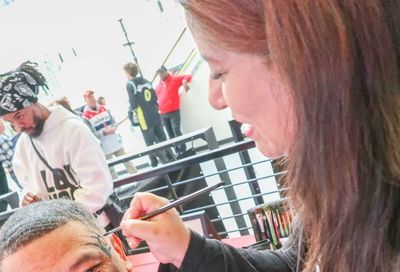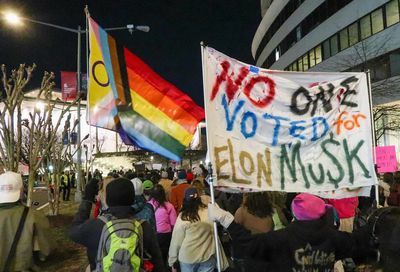To Your Health
Health: The LGBT Community Gets a Taste of its Own Medicine
The first annual lesbian, gay, bisexual and transgender health week is currently underway, reminding the LGBT community that its health needs go way beyond ginseng and Ripped Fuel.
On Monday, March 17, the National Coalition for LGBT Health held the first full day of its spring meeting at the National Press Club in D.C. Highlighting a day filled with speakers from both gay and mainstream health organizations was the release of results from major surveys conducted to assess the priorities of the LGBT community’s health concerns.
The surveys, conducted by Harris Interactive, reinforced some assumptions about LGBT health care priorities and challenged others.
|
Particularly surprising was data collected regarding smoking habits in the gay community, as well as information that dealt with the issue of health care access.
The data indicates that several factors make smoking a bigger problem among gays than it is among straight people. While many conference attendees nodded knowingly at the data that showed gay adults tend to smoke more than straight adults, some groaned when told that only about one in ten gay adults have ever seen a gay-targeted anti-smoking message.
The dearth in visible anti-smoking campaigns directed toward the LGBT community does not, however, mirror an absence of cigarette ads aimed at hooking the community on nicotine. Documents declassified by a litigation settlement in 1998 revealed an R.J. Reynolds marketing campaign called “Project SCUM ” that targeted gays and homeless people as a niche market.
Despite higher smoking rates among LGBT people, however, survey results also indicated that gays would be more willing to shell out an extra cover charge for smoke-free bars and clubs — nearly half would pay five dollars or more. Only about a third of straight people said they would willing to pay that much, and nearly half of straights said they wouldn’t pay anything extra for a smoke-free venue.
There were also some surprises regarding the issue of health care access. For instance, finding a gay-friendly health care provider was put on par with finding one who is covered by the respondent’s health plan — both nearly tied for gay people’s top priorities in choosing a doctor. And just over half of the respondents reported that their doctor is unaware of their sexual orientation, which is a chief issue of focus for LGBT Health Week.
In a question and answer period, some attendees questioned the surveys’ methodologies. A few wondered how inclusive a survey conducted exclusively online could be.
Harris Interactive is best known for its online surveying services, a method that Michael Cover, Whitman-Walker Clinic’s Associate Executive Director for Public Affairs, called “pioneering. ” The results undergo a technique called “propensity weighting ” that uses census statistics and the results of past surveys to account for those who might not have Internet access.
“We think our technique allows us to compensate for that, ” said David Krane, Senior Vice President of Harris Interactive, “but we’re always looking for ways to improve that technique. ”
Others cited concerns about the how well the survey served the transgender community, criticizing the fact that respondents could not identify as both transgender and select a sexual orientation.
At one point, Wes Combs, President of Witeck-Combs Communications, stood up to explain the difficulties of surveying transgender people.
“It’s been a very unique learning process through the years, ” he said. “On the transgender issue, we understand that there are differences. Surveying gays and lesbians is easier because marketers care most about people who are easier to reach. ”
He defended propensity weighting, calling it “the best way we can gather data today based on the technology that exists. ”
Combs, who is a member of the Gender PAC National Advisory Board, emphasized that out of Harris Interactive’s database of 15,000 LGBT participants, only a few hundred identify as transgender.
“There’s never been a survey I’ve been involved in that, when it was over, I didn’t wish we had asked some questions differently, ” said Krane after the Q&A session.
The conference also included a panel of representatives from mainstream health organizations who issued reports on what their organizations are doing to address LGBT health issues.
James Radack, Vice President for Public Education at the National Mental Health Association, highlighted that organization’s new program called “What Does Gay Mean? ” The program utilizes anti-bullying efforts already in place in schools to help sensitize faculty and parents to the plight of gay, lesbian and bisexual youth.
Clinton Anderson, the American Psychological Association’s Lesbian, Gay and Bisexual Concerns Officer, also emphasized the APA’s efforts in schools, and reported that the APA has filed more amicus briefs on behalf of GLB concerns than for any other group.
“Generally, we don’t take the lead on lesbian, gay and bisexual advocacy, but we’re in the room when someone asks us to be, ” he said, admitting that the organization has yet to undertake any systematic approach to transgender issues.
The American Medical Association “took a very positive stand in the late 1970s ” on behalf of gays and lesbians when homosexuality was removed from the APA’s list of mental illnesses, asserted Allen Maniker, M.D., an Associate Professor in the Department of Neurosurgery at New Jersey Medical School. The AMA has also addressed the idea that domestic partnership rights are beneficial to health, that sexual orientation conversion therapies are harmful, and that the exclusionary policies like those of the Boy Scouts of America may contribute to suicide rates.
The morning’s conference concluded with each panel member addressing the difficulties of dealing with the Bush administration on LGBT health issues.
“That partnership is not as healthy and collaborative as it used to be, ” said Shelly Hearne, Chairperson of the Executive Board of the American Public Health Association.
Sue Lachenmayr of the Society for Public Health Educators, seemed even more concerned.
“We have to increase our alliances to other communities, ” she said. “We really have to push the envelope. In this political climate, it’s critical. ”
Support Metro Weekly’s Journalism
These are challenging times for news organizations. And yet it’s crucial we stay active and provide vital resources and information to both our local readers and the world. So won’t you please take a moment and consider supporting Metro Weekly with a membership? For as little as $5 a month, you can help ensure Metro Weekly magazine and MetroWeekly.com remain free, viable resources as we provide the best, most diverse, culturally-resonant LGBTQ coverage in both the D.C. region and around the world. Memberships come with exclusive perks and discounts, your own personal digital delivery of each week’s magazine (and an archive), access to our Member's Lounge when it launches this fall, and exclusive members-only items like Metro Weekly Membership Mugs and Tote Bags! Check out all our membership levels here and please join us today!


















